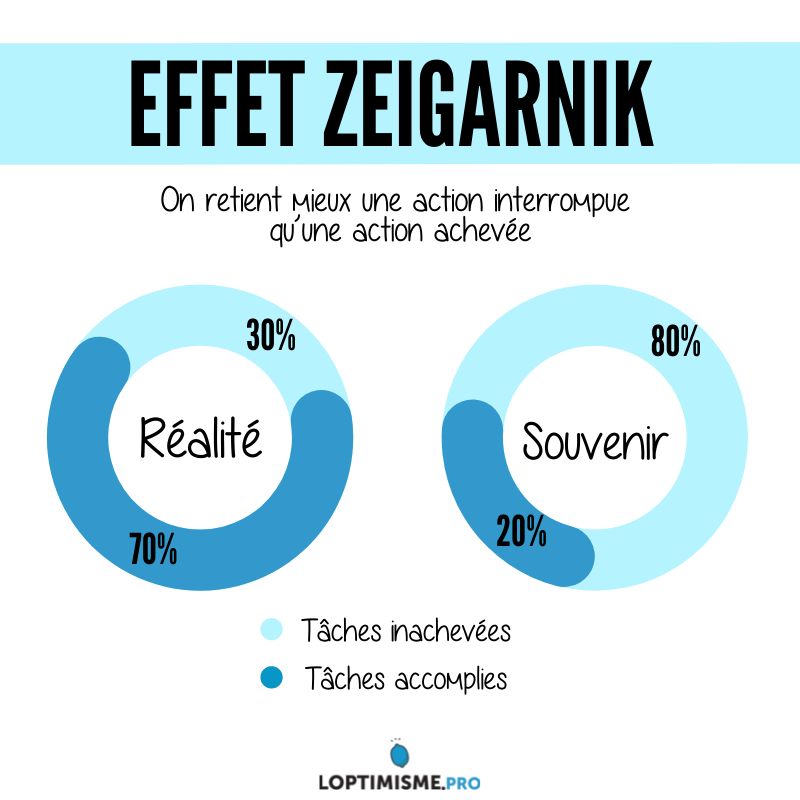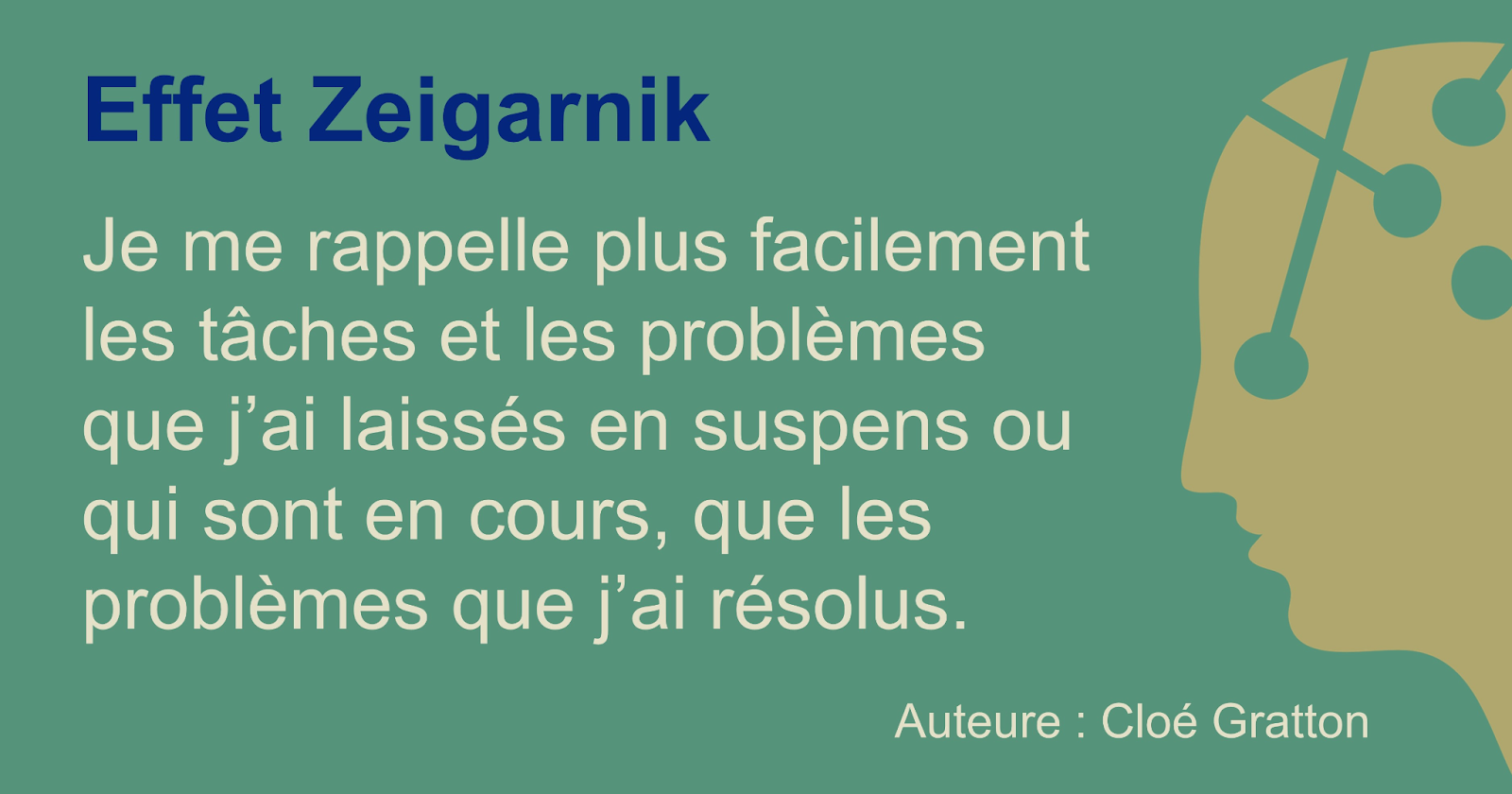Have you ever found yourself thinking obsessively about something you haven’t finished? Maybe a task left undone or an episode of a series you watched halfway through.
This struggle to get rid of these intrusive thoughts in your mind has a name in psychology: it’s called the Zeigarnik effect.
So, how does this phenomenon work? How can we use it to achieve our goals? And finally, can the Zeigarnik effect also manifest in romantic relationships? We’ll explain everything.
Table of Contents
ToggleWhat is the Zeigarnik Effect?
The Zeigarnik effect is a psychological phenomenon where unfinished or interrupted tasks remain more firmly embedded in our memory than those that are completed.
It is named after Russian psychologist Bluma Zeigarnik, who first observed this phenomenon in the 1920s by watching restaurant waiters. These waiters seemed to remember their customers’ orders only until the orders were fully served.

Credit : l’optimisme
Once the order was delivered, they would forget it quickly. Inspired by this observation, Zeigarnik conducted several experiments to better understand the effect.
Her research revealed that the human mind tends to keep unfinished tasks in memory, which creates a certain “cognitive tension” until they are resolved.
This psychological mechanism is driven by a feeling of incompleteness, which motivates individuals to remember what is unfinished in order to eventually complete it. The Zeigarnik effect is now widely used in marketing, project management, and even education for better productivity.
The Zeigarnik Effect: How Does It Work in Practice?
Our short-term memory has limited capacity; it can only hold a certain amount of information at once. To retain this information, we often have to repeat it, which requires mental effort.
Waiters are a striking example. To manage their tables well, they need to keep customers’ orders in mind until the service is complete. Dishes, drinks, and other details remain in memory as long as the task is ongoing. Faced with mental overload, people develop various methods to better remember things. The Zeigarnik effect is one such method, and it’s a natural activity of our brain.

Credit: wixstatic
It’s a phenomenon that makes us temporarily retain certain information by constantly ruminating on it in our mind. Thanks to this natural ability to dwell on unfinished tasks, we keep them in mind until they are completed, before pushing them out of our thoughts.
Examples to Better Understand the Zeigarnik Effect
The Zeigarnik effect is constantly at play in our everyday lives. Here are some common examples to help better understand the concept :
Suspense TV Series
When you stop an episode in the middle of a plot, it often stays on your mind until you watch the next one. Screenwriters use this technique to maintain viewer interest, exploiting the Zeigarnik effect to make you eager to see the resolution.
Unfinished Tasks at Work
An incomplete task, such as a report in progress or an email left in drafts, can haunt you throughout the day. As long as it’s unfinished, it continues to capture your attention and return to your thoughts.
Forgotten Grocery List
If you leave the house with an incomplete grocery list in mind, the items you haven’t bought yet are likely to occupy your mind. The Zeigarnik effect pushes you to constantly think about the remaining items to avoid forgetting them.
Unfinished Conversations
When an important discussion is interrupted, unresolved topics often come back to mind, creating a need to pick up the conversation again. This phenomenon explains why unresolved conversations leave us with a sense of incompleteness.
Personal Projects on Hold
Whether it’s a book you started, a puzzle you left aside, or a course you didn’t finish, these unfinished projects tend to persist in your mind. This constant reminder is a Zeigarnik effect that pushes you to complete what you’ve started.
The Zeigarnik Effect: How to Use It to Achieve Your Goals?
The Zeigarnik effect can actually help us improve many aspects of our daily lives. Once we understand how it works, we can use it strategically to reach our goals.
Stay Motivated
The Zeigarnik effect is an effective method for staying motivated, especially when we have long-term projects. By breaking a large goal into smaller steps, each unfinished subtask creates a reminder in our mind that there’s still work to be done, which naturally pushes us to keep moving forward.
It’s especially useful in fighting procrastination: with a bit of discipline, knowing that a task is unfinished gives us the momentum to return to it. As a result, even overwhelming projects become easier to manage because we always have that mental reminder driving us to progress.
Boost Memory
The Zeigarnik effect can also be a great ally for boosting our ability to retain information. By purposely interrupting a study or reading session before we’ve fully absorbed everything, we leave our brain in a kind of “unfinished” state. This creates a slight mental load, keeping the information suspended in our mind, much like an unsaved file on a computer.

Credit : i0.wp
When we return to our study session, the details tend to be better anchored, and connections between ideas are formed more naturally. This method can be very helpful during study periods. In a way, the method forces our mind to constantly revisit pending concepts, which facilitates better memorization.
Better Prioritization
The Zeigarnik effect can really help us organize our time and priorities better. Keeping a to-do list, separating what’s already done from what’s left to do, helps structure our activities and stay focused on what’s essential. Unfinished tasks become little reminders in the brain that encourage us to finish them.
This technique also helps mentally lighten our load. By writing down what still needs to be done, we free up space in our mind. This leaves more room for concentration and creativity without worrying about forgetting something. As a result, by the end of the day, we know exactly where we stand. We can easily pick up where we left off.
Zeigarnik Effect and Love: Its Influence on Romantic Relationships
The Zeigarnik effect is often discussed in the professional context to improve productivity, but it also has an impact on romantic relationships.
Difficulty Forgetting a Relationship That Never Began
Sometimes, we meet someone great, chemistry builds up, everything seems perfect, and then, suddenly, nothing. What could have been a great story remains in limbo, never really starting.
For our brain, this aborted relationship becomes like an “unfinished task.” It sends reminders urging us to “complete” what was started.
Even though technically there was no breakup (since there was never a real relationship), it becomes hard to move on.

Credit : elle.fr
We often find ourselves replaying shared moments, imagining what this relationship, which never existed, could have been. The brain constantly pushes us to think about it, making it really difficult to forget the other partner.
This is often the case with flirty situations that last for months without anything being officially defined. If one of the partners decides to walk away, the other may feel “stuck,” unable to move on.
Difficulty Forgetting an Ex
The Zeigarnik effect can also manifest in the context of breakups, especially when a relationship ends abruptly or without explanation. For instance, when a serious relationship ends and one partner is left behind without a clear reason.
Logically, the one who was dumped struggles with the breakup. They question themselves and wonder about the unanswered questions. First, it’s ambiguous, but over time, if nothing is resolved, the Zeigarnik effect takes hold.
For the brain, this breakup becomes like an unfinished task. In the absence of a clear reason for the separation, the mind keeps revisiting the situation, as if trying to “close the loop.”
The Zeigarnik effect brings the relationship up again and again, keeping the memories and unanswered questions alive. This can be an exhausting situation that sometimes requires professional help before one can move on.
The Zeigarnik Effect in a Relationship: How to Overcome This Struggle?
So, how can you break free from this loop? If you find yourself replaying a fight or situation with your partner, here are a few tips to overcome it:
Take a Step Back and Analyze Your Thoughts
The first step is to distance yourself. The goal here is to gain some distance from these recurring thoughts, take a moment to breathe, and avoid letting yourself be overwhelmed by the emotions of the moment.

Credit : esthervalentincoaching
Next, it’s important to try to analyze what’s really blocking you. Perhaps it’s an unspoken expectation, a need that hasn’t been understood, or simply a desire to feel heard. By taking the time to explore these points, it becomes easier to identify what’s left unresolved and open the door to dialogue.
Working together on unmet expectations
Often, it’s these unmet expectations that lie behind repetitive thoughts. Maybe you’re waiting for more support, more quality time, or more recognition. When these needs aren’t fulfilled, they can remain in the background.
The key here is to recognize these expectations not as complaints, but as legitimate desires or needs that, when shared, can improve your relationship.
Once identified, propose to your partner to work together to find ways to address them. Sometimes, small actions are enough to fulfill these expectations and reduce the feeling of incompleteness that the brain keeps dwelling on. Together, you and your partner will then be able to strengthen your relationship and develop a better mutual understanding.
Practicing mindfulness
Mindfulness is an effective exercise to counteract the Zeigarnik effect. With techniques such as meditation or deep breathing, we learn to welcome thoughts without judging them or letting them take control. In a relationship, this helps prevent being overwhelmed by bad memories.

Credit : istockphoto
The idea is simple: when a recurring thought arises, take a moment to breathe deeply and observe it without attachment. Mindfulness allows you to return to the present moment and free yourself from repetitive thoughts. It’s a powerful practice for regaining a state of calm and serenity. It helps you develop the ability to manage your emotions better, which benefits both your well-being and the strength of the relationship.
Learning to let go of small frustrations
Letting go can sometimes be easier said than done, especially in a relationship where every detail can feel important. However, learning to put small frustrations into perspective can be liberating. The Zeigarnik effect pushes us to hold onto every little disappointment or misunderstanding, but not everything deserves to be analyzed or resolved. Some things are simply a reflection of life’s ups and downs, and they need to be let go.
To achieve this, ask yourself if this frustration will truly matter in a week, a month, or even a year. If the answer is no, it might be worth letting it go. By letting small irritations slide, you create a more peaceful space in your mind for a more fulfilling relationship without the burden of unnecessary resentment. Learning to let go strengthens your ability to lighten not only your daily life but also build resilience in your relationship.
Frequently asked questions
Here are a few questions that often come up regarding the Zeigarnik effect that might be interesting to know:
What is the Zeigarnik effect?
The Zeigarnik effect is a psychological phenomenon discovered by researcher Bluma Zeigarnik in the 1920s. It refers to the natural tendency of the human mind to better retain unfinished tasks than completed ones. In other words, when we haven’t finished something, it remains suspended in our memory, often until the task is completed.
How does the Zeigarnik effect work?
The effect manifests because our minds maintain a sense of incompleteness for unfinished tasks. This can create a certain cognitive tension that keeps the information active in our memory. It’s a natural mechanism that helps us remember things until they are completed.
How does the Zeigarnik effect influence romantic relationships?
In a relationship, the Zeigarnik effect can cause someone to obsess over an unresolved situation or conversation. For example, an important conversation left unfinished can haunt a person. They may continue to fixate on the topic until the conversation is concluded.
How can we reduce the impact of the Zeigarnik effect in a relationship?
The first step in mitigating this effect is to encourage good communication. By expressing your thoughts and feelings, you reduce the attention given to misunderstandings. Practicing mindfulness and learning to let go of small frustrations can also help reduce these persistent thoughts.
Conclusion
The Zeigarnik effect reminds us of a universal concept: what remains unfinished holds a special place in our thoughts, whether it’s projects, goals, or romantic relationships.
By understanding this effect and using it to our advantage, we can channel this mental energy to move forward, whether it’s to accomplish our goals or strengthen our relationships.
Rather than being a mere psychological curiosity, the Zeigarnik effect turns out to be a powerful tool for staying motivated and growing in our lives, both personally and professionally.





